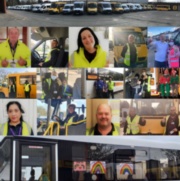No one left behind - Wolverhampton City Council's Travel Unit
Beth Cooper, Travel Unit Manager at Wolverhampton City Council, spoke to APSE Direct about how the authority’s travel unit for those in Special Educational Needs successfully adapted to the disruptions - both temporary and permanent - that arose as a consequence of the pandemic.
The path to success isn’t always signposted for us. Sometimes we are left to find our own way; and so it has been for the City of Wolverhampton Council’s Travel Unit.
For many years at the council, the statutory responsibility for special needs pupil and adult transport had been disjointed. This had led to inefficiencies, lack of specialist knowledge, staff disengagement and dissatisfied customers and stakeholders.
So, in 2019, we took matters in hand with the appointment of a single service lead and further recruitment to newly created management posts. Together, we began to work on those issues. But then came the immense challenges of COVID-19.
We faced social distancing which reduced the capacity of our vehicles, and severe staff shortages due to shielding requirements. But we began to work more closely than ever with our schools, supporting them as they, in turn, supported their most vulnerable pupils.
And we worked collaboratively with our operators and supported them by continuing to pay them 100% of their contractual rate. In return, they showed flexibility in the routes they covered.
This flexibility allowed us to use our in-house fleet to support other colleagues:
- Offering 14 vehicles and drivers to waste services, enabling the service to fully function despite social distancing on vehicles.
- Delivering more than 18,000 food parcels to some of the most vulnerable families in the city.
- Working with Public Health England to transport elderly and medically vulnerable residents to receive their vaccines.
- Carrying out vehicle checks, ensuring hired-in vans were safe for volunteers to drive.
- We are extremely proud of the work we did, giving help to every single child and adult that needed our assistance. No one was left behind.
When it came to planning the 2020/2021 academic year, it was clear COVID-19 was not going away. We needed new, innovative ways of working to build on our existing success.
One approach we undertook was changing every one of our 160+ routes to accommodate the class bubbles that schools had provided to us. We worked closely with PHE, Health and Safety, unions and schools to create new risk assessments, provide PPE and agree staggered start and finish times. This was widely recognised as helping to stop the spread of the virus within our service.
Now, more than two years into the creation of the new Travel Unit, our city is in a recovery phase and our team is looking at how we can continue to offer support.
After realising we can embrace new, innovative, and exciting ways of working, we now challenge ourselves to think differently and look for solutions without waiting for them to fall into our laps.
We currently face a new set of challenges:
- A rise in pupil numbers needing transport to provisions not currently supported by the unit has led to more single occupancy taxis being needed than ever
- A shortage of D1 licensed drivers which could put the service at risk
- The council has an ambitious target of being carbon net zero by 2028
- Rising fuel and living costs are leading to sharp increases in operator’s tender prices and recruitment is proving harder than ever.
- But, as before, we are facing these challenges head on. We are working with the city’s Wolves at Work initiative which aims to support residents back into employment.
New staff will be able to drive vehicles for which a D1 licence is not required, before being trained and supported to gain their D1 licence, or PCV licence. This will allow them to drive our larger in-house vehicles, preventing future driver shortages.
We have hired hybrid vehicles, helping to make our city a greener, cleaner place; while we work towards replacing our own ageing fleet with suitable ULEV or equivalent vehicles.
The success of the Travel Unit has meant that 24 wheelchair-accessible Euro 6 engine vehicles are currently on order to replace the oldest of our current buses. This will also drive financial efficiencies for the unit of around £200,000, as we are not reliant on external contractors for any of the work that we undertake.
We are also working far more closely with our colleagues in adult services, helping some of our most vulnerable, elderly residents to access our service for transport to day centres and social clubs.
We will continue to look for ways to reduce the downtime of our vehicles and increase the support we offer to our residents.
It is clear that the decision to redevelop and retain the in-house fleet has been critical to our success. Without these assets it would not have been possible to achieve all we have done through the pandemic and into the new normal.
• Beth Cooper spoke on this topic at the APSE Transport Seminar on 23 June. The presentation can be downloaded here.


.png)



.png)